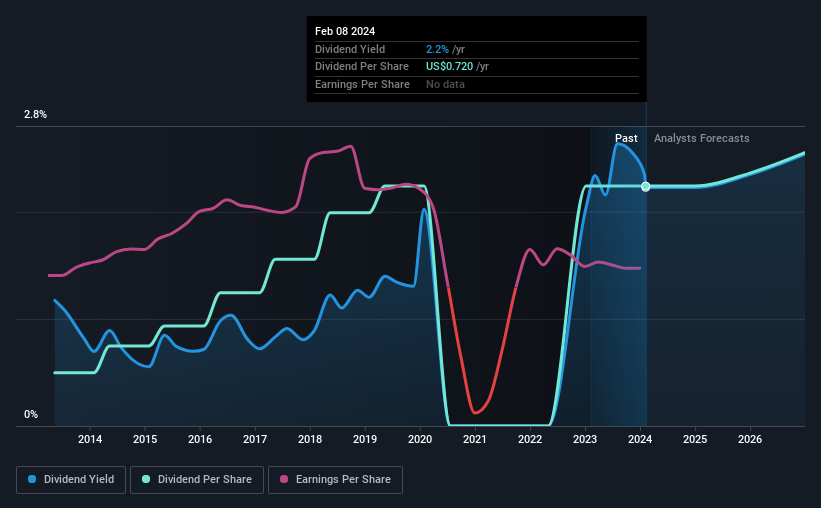
Southwest Airlines Co.'s (NYSE:LUV) investors are due to receive a payment of $0.18 per share on 27th of March. Based on this payment, the dividend yield will be 2.2%, which is fairly typical for the industry.
While the dividend yield is important for income investors, it is also important to consider any large share price moves, as this will generally outweigh any gains from distributions. Investors will be pleased to see that Southwest Airlines' stock price has increased by 40% in the last 3 months, which is good for shareholders and can also explain a decrease in the dividend yield.
See our latest analysis for Southwest Airlines
Southwest Airlines' Payment Has Solid Earnings Coverage
While it is always good to see a solid dividend yield, we should also consider whether the payment is feasible. Prior to this announcement, Southwest Airlines' dividend was making up a very large proportion of earnings, and the company was also not generating any cash flow to offset this. Generally, we think that this would be a risky long term practice.
The next year is set to see EPS grow by 193.9%. Assuming the dividend continues along the course it has been charting recently, our estimates show the payout ratio being 32% which brings it into quite a comfortable range.

Dividend Volatility
The company's dividend history has been marked by instability, with at least one cut in the last 10 years. Since 2014, the dividend has gone from $0.16 total annually to $0.72. This works out to be a compound annual growth rate (CAGR) of approximately 16% a year over that time. Dividends have grown rapidly over this time, but with cuts in the past we are not certain that this stock will be a reliable source of income in the future.
The Dividend Has Limited Growth Potential
Growing earnings per share could be a mitigating factor when considering the past fluctuations in the dividend. Southwest Airlines' earnings per share has shrunk at 28% a year over the past five years. Dividend payments are likely to come under some pressure unless EPS can pull out of the nosedive it is in. It's not all bad news though, as the earnings are predicted to rise over the next 12 months - we would just be a bit cautious until this becomes a long term trend.
The Dividend Could Prove To Be Unreliable
Overall, it's nice to see a consistent dividend payment, but we think that longer term, the current level of payment might be unsustainable. The track record isn't great, and the payments are a bit high to be considered sustainable. We would probably look elsewhere for an income investment.
Companies possessing a stable dividend policy will likely enjoy greater investor interest than those suffering from a more inconsistent approach. Still, investors need to consider a host of other factors, apart from dividend payments, when analysing a company. As an example, we've identified 1 warning sign for Southwest Airlines that you should be aware of before investing. If you are a dividend investor, you might also want to look at our curated list of high yield dividend stocks.
New: Manage All Your Stock Portfolios in One Place
We've created the ultimate portfolio companion for stock investors, and it's free.
• Connect an unlimited number of Portfolios and see your total in one currency
• Be alerted to new Warning Signs or Risks via email or mobile
• Track the Fair Value of your stocks
Have feedback on this article? Concerned about the content? Get in touch with us directly. Alternatively, email editorial-team (at) simplywallst.com.
This article by Simply Wall St is general in nature. We provide commentary based on historical data and analyst forecasts only using an unbiased methodology and our articles are not intended to be financial advice. It does not constitute a recommendation to buy or sell any stock, and does not take account of your objectives, or your financial situation. We aim to bring you long-term focused analysis driven by fundamental data. Note that our analysis may not factor in the latest price-sensitive company announcements or qualitative material. Simply Wall St has no position in any stocks mentioned.
About NYSE:LUV
Southwest Airlines
Operates as a passenger airline company that provides scheduled air transportation services in the United States and near-international markets.
Fair value with moderate growth potential.


